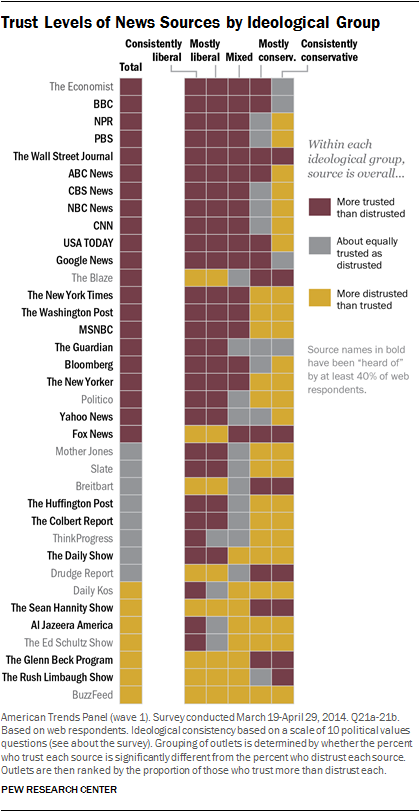A major part of the college experience, and the high school experience as well, is learning how to write well and submitting written assignments. Assignments can range from writing personal narratives, for which no research is required, to completing a thesis on a certain topic, which may require a massive amount of research. When researching, you need to be sure that you use appropriate sources, ones that will be trusted by your teacher, and that you cite them correctly. Having to see the dean or the principal about a plagiarism accusation as the result of failure to cite sources or incorrect citation can cost you your grade on the assignment and lead to academic probation. This blog post is broken into two parts: finding your sources and citing them.
Finding Appropriate Sources

The Pew Research Center studied how people of different political leanings perceive the trustworthiness of different news sources. Pew Research Center, 2014.
What type of sources you will need to find depends completely on your assignment. Many classes will have you write research papers, for which you should find scholarly, peer-reviewed sources, like books or journal articles. Others might ask you to sift through the news of the day to learn more about a certain topic, like climate change or a gallery opening. The following advice will teach you how to find the best sources for assignments.
Not all news sources are unbiased.
If you are researching current events, try to use reliable news sources, not those that lean in one political direction or the other. Left- or right-leaning news sources are inherently less reliable than sources that try to be as unbiased as possible because they are pushing an agenda. Based on research on journalism and the media conducted in 2014, the Pew Research Center created a list of trusted and distrusted news sources. Among those that are widely trusted include the Wall Street Journal, the Economist, BBC, ABC News, and USA Today. Sites like Mother Jones, Slate, Breitbart, the Huffington Post, and Drudge Report tend to skew one direction or the other politically and are therefore trusted by the half of the population who has similar views and distrusted by the opposing political party. News sources like Buzzfeed, the Rush Limbaugh Show, and the Ed Schultz Show are widely distrusted. If you plan on learning about current events, try to choose articles, data, and information from sources that are trusted by both the political left and the political right.
If you just want to stay up-to-date on news from around the world for your own good, consider subscribing to theSkimm, a weekday newsletter delivered straight to your inbox, which recaps the major current events of the day before. Delivered with a bit of humor and plenty of its own citations, it’s a great way to stay informed (for free!) without having to spend too much time scouring the news each day.
Know what sources to avoid.
It should go without saying that other people’s Facebook, Twitter, and other social media posts are generally not appropriate sources for credible news. Just because you trust your older cousin doesn’t mean that she is going to take the time to fact-check anything that she’s posting online. While social media is a good way to make your opinions known, people tend to share articles and news that agrees with them. Instead of posting articles from the Wall Street Journal or the Economist, people are more likely to share news from something like Occupy Democrats. If you’re interested in learning more about something that you did see on social media, look up credible sources and do some fact-checking on your own.

Giphy
That being said, even though everyone uses it, Wikipedia is also not a wholly credible source of information. As stated on the “Wikipedia: About” page:
“Wikipedia is written collaboratively by largely anonymous volunteers who write without pay. Anyone with Internet access can write and make changes to Wikipedia articles, except in limited cases where editing is restricted to prevent disruption or vandalism. Users can contribute anonymously, under a pseudonym, or, if they choose to, with their real identity.”
Since you can’t verify who is writing the articles and their qualifications to be writing about a certain topic, everything that you find on Wikipedia must be taken with a grain of salt. While your professors are very unlikely to accept any Wikipedia citations as true research, it can still provide a great jumping off point for you to get the general background of your topic before delving deeper into your research with more credible sources.
Find out where the research is coming from.
When it comes to research, it’s not all created equally. Look for journal articles that have been peer reviewed (you should be able to narrow down search results of your school’s library so that they fit this criterion). A peer-reviewed article is one that has been read and reviewed by experts in the field. The reviewers have submitted questions or requested clarification of points during the editing process, read the revised edition, and accepted the article for publishing. If the reviewers did not agree that the research methods or findings were valid, they would have rejected its publication. An article that has undergone the peer-review process has been thoroughly vetted by other academics. Search engines like Web of Science (if your school subscribes) also allow you to check how many times an article has been cited by other authors. The higher the number of citations, the more respected the original article.
Once you know that an article or book has been peer reviewed, you also want to see if you can find who is funding the research. This adds a degree of trustworthiness to the article, depending on what you find. Articles that are published by universities and professional societies (such as the American Medical Association or the Ecological Society of America) are generally trustworthy, but check the acknowledgements just in case. If you find that an article that is spouting the benefits of oil was funded by an oil company, those findings are likely biased. As an additional precaution, check out the credentials of the author. Someone whose background is in mathematics might not be the best source of information on the development of the English language. It’s always better to be cautious.
Know your dates.

Psych / Giphy
Look for dates and time stamps if you’re researching old articles that were initially published in newspapers, journals, or online. Research changes constantly, theories are proven, others are disproven, and new findings are constantly being announced. While it can be useful to refer to the foundational work in a field regardless of how long ago it occurred, the more up-to-date information you can find, the better. For example, much within the field of psychology was based upon the work of Sigmund Freud, but many of his theories have since been discounted. As another example, think about space science. If you have to write a paper on the newest findings of Pluto, you probably shouldn’t talk about Pluto as if it were still a planet since that was determined not to be the case in 2006. For this topic, you should look for scientific research that has happened within the past decade. Unless your assignment says to focus on a certain period of time, credible, newer sources are better; how far back these credible, newer sources go depends on your topic and field of study.
Citing Sources Appropriately
If you do not cite your sources, you are at risk of being caught plagiarizing, which is unacceptable at all levels of academia. While being caught plagiarizing once may only result in a zero on the assignment and academic probation, repeat offenders may fail the class or be asked to leave school. Plagiarism is cheating, period. Deciding to plagiarize on an assignment is academically dishonest and strips you of the ability to learn the material in question. You can prevent plagiarism charges simply by citing the sources you reference within your written text and at the end of the text in a full “works cited” section.
Depending on your professor and the subject matter, you may be asked to cite your sources in different formats. Modern Language Association (MLA), American Psychological Association (APA), and Chicago (the Chicago Manual of Style) are the three most common citation formats, though each deals with more than just citations. Each style provides a guide to the structure of a paper, the grammar, and the font that should be used. MLA is generally used for liberal arts and humanities courses, APA is most frequently used for social science courses, and Chicago is used for both humanities and social science courses. Some classes may require more specific styles: a geology class may require that you use the Geological Society of America citation style while a premed class may ask that you use the American Medical Association (AMA) style.
If you specifically need help writing and formatting your citations, the Purdue University Online Writing Lab provides resources for MLA, APA, Chicago, and AMA style.

wavebreakmedia / Shutterstock.com
Make an appointment with someone in the campus writing center.
If you are having trouble finding sources, talking to a librarian or your professor is the best way to get a nudge in the right direction. If you’re having trouble citing sources in academic papers, the campus writing center should be your first stop. Most campuses have writing centers staffed by students in the English department, graduate students, or students who have proven an affinity for writing who can help you review and format your papers correctly. Making an appointment for a lesson in citations before your assignment is due will also help you in the future.
-
Eight Ways to Lessen Stress and Fatigue while Studying
-
Why You Should Take RateMyProfessors.com with a Grain of Salt
-
Deciding Whether or Not You Should Drop a Class
-
Executive Functioning Skills: Cognitive Flexibility
-
Everything You Need to Know about the MCAT
-
Executive Functioning Skills: Focus and Self-Control
-
How to Maintain a School-Life Balance
-
Everything You Need to Know about the GMAT
-
Ditch the Laptop. Seriously.
-
What Happens When You Cheat or Plagiarize: A Guide for High Schoolers
-
Why Learning Should Be Wacky and Wild, Explained by Ms. Frizzle
-
Nine Apps to Help Any Student Study for Any Class

